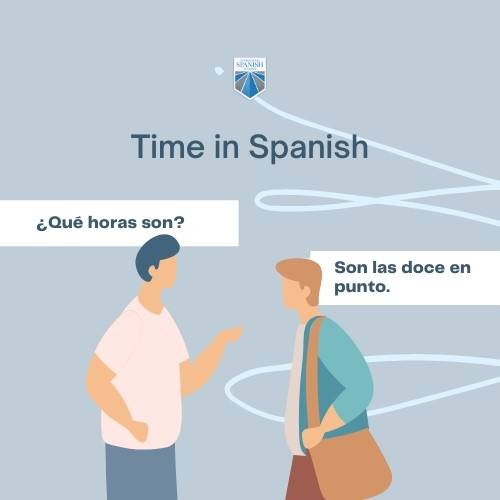
50+ Time Expressions in Spanish for Better Conversations
Learning time expressions in Spanish allows you to improve your language skills and to talk more naturally in the language.
Because one thing is to be able to communicate in your goal language, but a whole different one is to use expressions that only native speakers master.
Keep reading to learn over 50-time expressions in Spanish that will make you sound like a native Spanish speaker in no time!
Time in Spanish
Talking about time and telling the time in Spanish are unavoidable situations that every Spanish student will have to deal with at some point. Time is just a very important part of our lives and we talk about it “all the time.”
For this reason, numerous time expressions in Spanish exist. Let’s learn some of the most common ones:
50+ Time Expressions in Spanish
The following list of simple time expressions in Spanish includes the expression in Spanish, the translation to English, and examples of how to use each one of them. I’ve divided the expressions in categories to make it easier for you to learn them.
Telling Time: Expressions in Spanish
If you want to tell the time in Spanish, I recommend you to read this post about the topic. Here, I’m only including the most useful expressions to tell the time in Spanish.
You can use the following telling time expressions in Spanish at any hour of the day.
1. Son las doce en punto
“It’s twelve o’clock”
Example:
¿Qué horas son?
Son las doce en punto.
What time is it?
It’s twelve o’clock

2. Son las doce y cuarto
“It’s quarter past twelve”
Example:
¿A qué hora llega papá?
A las doce y cuarto.
At what time does dad arrive?
At quarter past twelve.
3. Son las doce y media
“It’s half past twelve”
Example:
¿A qué hora empezó la película?
A las doce y media
At what time does the movie start?
At half-past twelve.
4. Son las doce menos cuarto
“It’s quarter to twelve”
Example:
¿Qué horas son?
Son las doce menos cuarto.
What time is it?
It’s quarter to twelve.
5. Cuarto para las doce
This is a different way to say the same thing as in the previous expression: “It’s quarter to twelve.”
Example:
¿Qué horas son?
Falta un cuarto para las doce.
What time is it?
It’s quarter to twelve.
6. Falta media hora
“In half an hour”
Example:
¿Cuánto falta para que llegue papá?
Falta media hora.
How long until dad arrives?
Half an hour.
7. En un cuarto de hora
“In fifteen minutes”
Example:
¿Cuándo empieza la película?
En un cuarto de hora.
When will the movie start?
In fifteen minutes.

Vague Time
We talk in vague terms about time more than you think. These are some of the most used vague time expressions in Spanish:
8. En nuestros días
“Nowadays”
Example:
En nuestros días, ya nadie escribe cartas.
Nowadays, nobody writes letters anymore.
9. Al rato
“Later”
Example:
Nos vemos al rato.
See you later.
10. Un día de estos
“One of these days”
Example:
Un día de estos voy a visitar París.
One of these days I’ll visit Paris.
11. Próximamente
“Coming soon”
Example:
Próximamente en su cine favorite.
Coming soon to your favorite theater.
12. Recientemente
“Recently”
Example:
Recientemente, me duele mucho la espalda.
Recently, my back has been hurting a lot.
13. En los últimos días
“In the last few days”
Example:
En los últimos días ha llovido mucho.
In the last few days, it’s been raining a lot.
14. El otro dia
“The other day”
Example:
El otro día vi a tu hermano.
I saw your brother the other day.
15. Algún día
“One day”
Example:
Algún día me casaré con María.
I’ll marry Maria one day.
16. Hace mucho tiempo
“A long time ago”
Example:
Hace mucho tiempo en una galaxia muy lejana…
A long time ago in a galaxy far, far away…
17. Hace poco
“Not long ago”
Example:
Hace poco que hablé con Miguel.
I spoke with Miguel not long ago.

Past Time Expressions in Spanish
Use the following expressions to talk about the past in Spanish.
18. Ayer
“Yesterday”
Example:
Ayer comí pizza.
I ate pizza yesterday.
19. La semana pasada
“Last week”
Example:
La semana pasada fui al mercado.
I went to the market last week.
Use this expression also with mes (month) and año (year), just make sure to change the gender to masculine as both terms are masculines.
Example:
El mes (año) pasado compré un carro nuevo.
I bought a new car last month (year).
20. Hace una semana
“A week ago”
Example:
¿Cuándo hablaste con tu hermano por última vez?
Hace una semana.
When did you speak with your brother for the last time?
A week ago.
You can also use this expression also with mes and año, fixing the gender of the phrase.
Example:
¿Cuándo hablaste con tu hermano por última vez?
Hace un mes (año).
When did you speak with your brother for the last time?
A month (year) ago.
Present Time Expressions in Spanish
When talking about the present, use these time expressions in Spanish:
21. Hoy
“Today”
Example:
Hoy es lunes.
Today is Monday.
22. Ahora
“Now”
Example:
Quiero ese libro ahora.
I want that book now.
23. Este día
“This day”
Example:
Este día ha sido complicado.
This day has been complicated.
You can also use this expression with semana, mes, and año, making sure to modify the gender according to the noun selected.
Example:
Esta semana ha sido complicada.
This week has been complicated.

24. En este momento
“At this moment”
Example:
En este momento estoy hablando con tu hermana.
I’m speaking with your sister at the moment.
25. Estos días
“These days”
Example:
Estos días han sido muy hermosos.
These days have been beautiful.
Future Time Expressions in Spanish
Use the following time expressions in Spanish to talk about the future.
26. Mañana
“Tomorrow”
Example:
Mañana tengo examen.
I have a test tomorrow.
27. El próximo lunes
“Next Monday”
Example:
El próximo lunes empiezan las classes.
Classes start next Monday.
Use this expression with any day of the week.
28. La próxima semana
“Next week”
Example:
La próxima semana llega mamá.
Mom arrives next week.
You can also use this expression with mes, and año, making sure to modify the gender according to the noun selected.
29. La semana siguiente
Just a different way to say the same thing as the previous expression: “Next week”
Example:
La semana siguiente llega mamá.
Mom arrives next week.
You can also use this expression with mes, and año, making sure to modify the gender according to the noun selected.
30. La semana que viene
Just a different way to say the same thing as the previous expression: “Next week”
Example:
La semana que viene llega mamá.
Mom arrives next week.
You can also use this expression with mes, and año, making sure to modify the gender according to the noun selected.
31. Después
Después has different meanings in English: after, later, afterwards, and then. In Spanish, you can use the same word to express all those different ideas.
Example:
Te recojo después de clases.
I’ll pick you up after classes.
32. Luego
Luego is just another way of saying después in Spanish.
Example:
Luego te recojo.
I’ll pick you up later.
Desde and Hasta
These two words are very used in time expressions in Spanish. Let’s learn how to use them correctly:
33. Desde entonces
“Since then”
Example:
Desde entonces no lo he vuelto a ver.
Since then, I haven’t seen him.
34. Desde el lunes
“Since Monday”
Example:
Desde el lunes que no voy a la escuela.
I haven’t gone to school since Monday.
Use this phrase with any day of the week.
35. Desde 2010
“Since 2010”
Example:
Desde 2010 que no voy a mi país.
I haven’t been in my country since 2010.
Use this expression with any year.
36. Desde hace
“In a…”
Example:
Desde hace una semana que no veo a María.
I haven’t seen Maria in a week.
You can also use this expression with mes, año, making sure to modify the gender according to the noun selected.
37. Desde que
“Since…”
Example:
Desde que llegué a España me duele la espalda.
My back has been hurting since I arrived in Spain.
38. Hasta el lunes
“Until next Monday”
Example:
No iré a la escuela hasta el lunes.
I won’t go to school until next Monday.
Use this expression with any day of the week.
39. Hasta la próxima semana
“Until next week”
Example:
¿Hasta cuándo te quedas en México?
Hasta la próxima semana.
How long are you staying in Mexico?
Until next week.
You can also use this expression with mes, año, making sure to modify the gender according to the noun selected.
40. Hasta diciembre
“Until December”
Example:
¿Cuánto tiempo te quedas aquí?
Hasta diciembre.
How long are you staying here?
Until December.
Use this expression with any month of the year.

41. Hasta que te conocí
“Until I met you”
Example:
Yo era muy feliz hasta que te conocí.
I was very happy until I met you.
Idioms
Finally, these are a few of the most common idioms used in time expressions in Spanish.
42. Ahorita
“Right now (kind of)”
Example:
Apenas llegué ahorita.
I’m just arriving right now.
43. El tiempo pasa volando
“Time flies”
Example:
¡Cómo has crecido! De verdad que el tiempo pasa volando.
How much have you grown! It’s true that time flies.
44. Parece que fue ayer
“It seems like it was yesterday”
Example:
Parece que fue ayer cuando ibas al kinder.
It seems like it was yesterday when you went to kindergarten.
45. Tengo mucho tiempo
“I have a lot of time”
Example:
Cuando puedas nos reunimos, yo tengo mucho tiempo.
We can meet any time you want, I have a lot of time.
46. No tengo nada de tiempo
This is a good example of a double negative properly used in Spanish: “I have no time at all”
Example:
Estos días no tengo nada de tiempo.
I have no time at all these days.
47. Hace tiempo que
“It’s been a while since”
Example:
Hace tiempo que no te veo.
It’s been a while since I saw you for the last time.
48. En los últimos días
“In the last few days”
Example:
En los últimos días no me he estado sintiendo bien.
I haven’t felt well in the last few days.
49. Todo el tiempo del mundo
“All the time in the world”
Example:
Parece que Carlos tiene todo el tiempo del mundo.
It seems like Carlos has all the time in the world.
50. Por último
“Finally”
Example:
Por último, debo decir que me divertí mucho.
Finally, I have to say that I had a lot of fun.
51. Últimamente
“Lately”
Example:
Últimamente me ha ido muy bien.
Lately, I’ve been doing very well.
Practice Your Time Expressions in Spanish
Using time expressions in Spanish is a good sign that your Spanish is progressing into advanced mode. Remember that by speaking Spanish you’ll be able to talk to more people in the US, as CNN reports that there are around 53 million people who speak Spanish in this country.
Practice your time expressions in real-time with real teachers to polish your fluency! Sign up for a free Spanish class with one of our certified, native Spanish-speaking teachers from Guatemala. We offer flexible scheduling and tailored Spanish packages.

Ready to learn more Spanish grammar and vocabulary? Check these out!
Learning time expressions in Spanish allows you to improve your language skills and to talk more naturally in the language.
Because one thing is to be able to communicate in your goal language, but a whole different one is to use expressions that only native speakers master.
Keep reading to learn over 50-time expressions in Spanish that will make you sound like a native Spanish speaker in no time!
Time in Spanish
Talking about time and telling the time in Spanish are unavoidable situations that every Spanish student will have to deal with at some point. Time is just a very important part of our lives and we talk about it “all the time.”
For this reason, numerous time expressions in Spanish exist. Let’s learn some of the most common ones:
50+ Time Expressions in Spanish
The following list of simple time expressions in Spanish includes the expression in Spanish, the translation to English, and examples of how to use each one of them. I’ve divided the expressions in categories to make it easier for you to learn them.
Telling Time: Expressions in Spanish
If you want to tell the time in Spanish, I recommend you to read this post about the topic. Here, I’m only including the most useful expressions to tell the time in Spanish.
You can use the following telling time expressions in Spanish at any hour of the day.
1. Son las doce en punto
“It’s twelve o’clock”
Example:
¿Qué horas son?
Son las doce en punto.
What time is it?
It’s twelve o’clock

2. Son las doce y cuarto
“It’s quarter past twelve”
Example:
¿A qué hora llega papá?
A las doce y cuarto.
At what time does dad arrive?
At quarter past twelve.
3. Son las doce y media
“It’s half past twelve”
Example:
¿A qué hora empezó la película?
A las doce y media
At what time does the movie start?
At half-past twelve.
4. Son las doce menos cuarto
“It’s quarter to twelve”
Example:
¿Qué horas son?
Son las doce menos cuarto.
What time is it?
It’s quarter to twelve.
5. Cuarto para las doce
This is a different way to say the same thing as in the previous expression: “It’s quarter to twelve.”
Example:
¿Qué horas son?
Falta un cuarto para las doce.
What time is it?
It’s quarter to twelve.
6. Falta media hora
“In half an hour”
Example:
¿Cuánto falta para que llegue papá?
Falta media hora.
How long until dad arrives?
Half an hour.
7. En un cuarto de hora
“In fifteen minutes”
Example:
¿Cuándo empieza la película?
En un cuarto de hora.
When will the movie start?
In fifteen minutes.

Vague Time
We talk in vague terms about time more than you think. These are some of the most used vague time expressions in Spanish:
8. En nuestros días
“Nowadays”
Example:
En nuestros días, ya nadie escribe cartas.
Nowadays, nobody writes letters anymore.
9. Al rato
“Later”
Example:
Nos vemos al rato.
See you later.
10. Un día de estos
“One of these days”
Example:
Un día de estos voy a visitar París.
One of these days I’ll visit Paris.
11. Próximamente
“Coming soon”
Example:
Próximamente en su cine favorite.
Coming soon to your favorite theater.
12. Recientemente
“Recently”
Example:
Recientemente, me duele mucho la espalda.
Recently, my back has been hurting a lot.
13. En los últimos días
“In the last few days”
Example:
En los últimos días ha llovido mucho.
In the last few days, it’s been raining a lot.
14. El otro dia
“The other day”
Example:
El otro día vi a tu hermano.
I saw your brother the other day.
15. Algún día
“One day”
Example:
Algún día me casaré con María.
I’ll marry Maria one day.
16. Hace mucho tiempo
“A long time ago”
Example:
Hace mucho tiempo en una galaxia muy lejana…
A long time ago in a galaxy far, far away…
17. Hace poco
“Not long ago”
Example:
Hace poco que hablé con Miguel.
I spoke with Miguel not long ago.

Past Time Expressions in Spanish
Use the following expressions to talk about the past in Spanish.
18. Ayer
“Yesterday”
Example:
Ayer comí pizza.
I ate pizza yesterday.
19. La semana pasada
“Last week”
Example:
La semana pasada fui al mercado.
I went to the market last week.
Use this expression also with mes (month) and año (year), just make sure to change the gender to masculine as both terms are masculines.
Example:
El mes (año) pasado compré un carro nuevo.
I bought a new car last month (year).
20. Hace una semana
“A week ago”
Example:
¿Cuándo hablaste con tu hermano por última vez?
Hace una semana.
When did you speak with your brother for the last time?
A week ago.
You can also use this expression also with mes and año, fixing the gender of the phrase.
Example:
¿Cuándo hablaste con tu hermano por última vez?
Hace un mes (año).
When did you speak with your brother for the last time?
A month (year) ago.
Present Time Expressions in Spanish
When talking about the present, use these time expressions in Spanish:
21. Hoy
“Today”
Example:
Hoy es lunes.
Today is Monday.
22. Ahora
“Now”
Example:
Quiero ese libro ahora.
I want that book now.
23. Este día
“This day”
Example:
Este día ha sido complicado.
This day has been complicated.
You can also use this expression with semana, mes, and año, making sure to modify the gender according to the noun selected.
Example:
Esta semana ha sido complicada.
This week has been complicated.

24. En este momento
“At this moment”
Example:
En este momento estoy hablando con tu hermana.
I’m speaking with your sister at the moment.
25. Estos días
“These days”
Example:
Estos días han sido muy hermosos.
These days have been beautiful.
Future Time Expressions in Spanish
Use the following time expressions in Spanish to talk about the future.
26. Mañana
“Tomorrow”
Example:
Mañana tengo examen.
I have a test tomorrow.
27. El próximo lunes
“Next Monday”
Example:
El próximo lunes empiezan las classes.
Classes start next Monday.
Use this expression with any day of the week.
28. La próxima semana
“Next week”
Example:
La próxima semana llega mamá.
Mom arrives next week.
You can also use this expression with mes, and año, making sure to modify the gender according to the noun selected.
29. La semana siguiente
Just a different way to say the same thing as the previous expression: “Next week”
Example:
La semana siguiente llega mamá.
Mom arrives next week.
You can also use this expression with mes, and año, making sure to modify the gender according to the noun selected.
30. La semana que viene
Just a different way to say the same thing as the previous expression: “Next week”
Example:
La semana que viene llega mamá.
Mom arrives next week.
You can also use this expression with mes, and año, making sure to modify the gender according to the noun selected.
31. Después
Después has different meanings in English: after, later, afterwards, and then. In Spanish, you can use the same word to express all those different ideas.
Example:
Te recojo después de clases.
I’ll pick you up after classes.
32. Luego
Luego is just another way of saying después in Spanish.
Example:
Luego te recojo.
I’ll pick you up later.
Desde and Hasta
These two words are very used in time expressions in Spanish. Let’s learn how to use them correctly:
33. Desde entonces
“Since then”
Example:
Desde entonces no lo he vuelto a ver.
Since then, I haven’t seen him.
34. Desde el lunes
“Since Monday”
Example:
Desde el lunes que no voy a la escuela.
I haven’t gone to school since Monday.
Use this phrase with any day of the week.
35. Desde 2010
“Since 2010”
Example:
Desde 2010 que no voy a mi país.
I haven’t been in my country since 2010.
Use this expression with any year.
36. Desde hace
“In a…”
Example:
Desde hace una semana que no veo a María.
I haven’t seen Maria in a week.
You can also use this expression with mes, año, making sure to modify the gender according to the noun selected.
37. Desde que
“Since…”
Example:
Desde que llegué a España me duele la espalda.
My back has been hurting since I arrived in Spain.
38. Hasta el lunes
“Until next Monday”
Example:
No iré a la escuela hasta el lunes.
I won’t go to school until next Monday.
Use this expression with any day of the week.
39. Hasta la próxima semana
“Until next week”
Example:
¿Hasta cuándo te quedas en México?
Hasta la próxima semana.
How long are you staying in Mexico?
Until next week.
You can also use this expression with mes, año, making sure to modify the gender according to the noun selected.
40. Hasta diciembre
“Until December”
Example:
¿Cuánto tiempo te quedas aquí?
Hasta diciembre.
How long are you staying here?
Until December.
Use this expression with any month of the year.

41. Hasta que te conocí
“Until I met you”
Example:
Yo era muy feliz hasta que te conocí.
I was very happy until I met you.
Idioms
Finally, these are a few of the most common idioms used in time expressions in Spanish.
42. Ahorita
“Right now (kind of)”
Example:
Apenas llegué ahorita.
I’m just arriving right now.
43. El tiempo pasa volando
“Time flies”
Example:
¡Cómo has crecido! De verdad que el tiempo pasa volando.
How much have you grown! It’s true that time flies.
44. Parece que fue ayer
“It seems like it was yesterday”
Example:
Parece que fue ayer cuando ibas al kinder.
It seems like it was yesterday when you went to kindergarten.
45. Tengo mucho tiempo
“I have a lot of time”
Example:
Cuando puedas nos reunimos, yo tengo mucho tiempo.
We can meet any time you want, I have a lot of time.
46. No tengo nada de tiempo
This is a good example of a double negative properly used in Spanish: “I have no time at all”
Example:
Estos días no tengo nada de tiempo.
I have no time at all these days.
47. Hace tiempo que
“It’s been a while since”
Example:
Hace tiempo que no te veo.
It’s been a while since I saw you for the last time.
48. En los últimos días
“In the last few days”
Example:
En los últimos días no me he estado sintiendo bien.
I haven’t felt well in the last few days.
49. Todo el tiempo del mundo
“All the time in the world”
Example:
Parece que Carlos tiene todo el tiempo del mundo.
It seems like Carlos has all the time in the world.
50. Por último
“Finally”
Example:
Por último, debo decir que me divertí mucho.
Finally, I have to say that I had a lot of fun.
51. Últimamente
“Lately”
Example:
Últimamente me ha ido muy bien.
Lately, I’ve been doing very well.
Practice Your Time Expressions in Spanish
Using time expressions in Spanish is a good sign that your Spanish is progressing into advanced mode. Remember that by speaking Spanish you’ll be able to talk to more people in the US, as CNN reports that there are around 53 million people who speak Spanish in this country.
Practice your time expressions in real-time with real teachers to polish your fluency! Sign up for a free Spanish class with one of our certified, native Spanish-speaking teachers from Guatemala. We offer flexible scheduling and tailored Spanish packages.

Ready to learn more Spanish grammar and vocabulary? Check these out!
- The 25 Most Useful Spanish Phrases You Need to Lear Today
- Top 20 Guatemalan Words and Slang Expressions You Should Know
- Bien vs Bueno: How Good is Your Spanish?
- How to Talk About Learning a Language in Spanish
- Señora vs Señorita: Who Is She?
- Learn These 20 Types of Fish in Spanish [+ More Vocab]
- 200+ Beginner Spanish Vocabulary Words PDF: Learn Spanish Fast!
- The Most Extensive Guide Ever to House Vocabulary in Spanish
- 50 Useful Spanish Transition Words for Everyday Speech and Writing - January 30, 2025
- Master the 18 Spanish Tenses (and Take Our Cheat Sheet With You) - January 23, 2025
- A Guide to Double Negatives in Spanish - December 18, 2024




